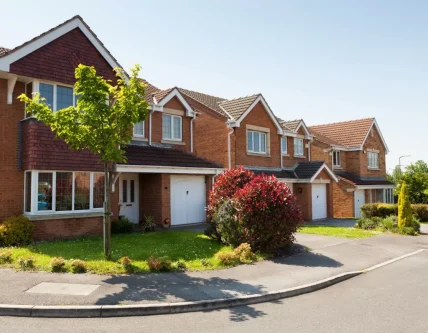House and Bankruptcy

You may think your house will be sold if you go Bankrupt. This is not necessarily the case and will depend on a range of circumstances.
Jump to article content:
- What happens to your House if you go Bankrupt?
- The affect on your House if there is Equity
- What if you have no Equity in your property?
- What if your house is owned in joint Names?
Want to find out how to protect your home if you go bankrupt? Give us a call (0800 044 3194) or click here to complete the form below and we’ll call you back
What happens to your House if you go Bankrupt
After you go bankrupt your interest in your house and any other property you own is transferred to the Official Receiver (OR). In monetary terms your interest (also known as beneficial interest) is equal to your share of the equity in the property.
This does not mean that your house is immediately sold. Normally you will be able to continue living there at least for the short term as long as you maintain the mortgage payments.
However the OR will eventually have to take action to realise your share of any equity.
Mortgage debt is not included in Bankruptcy. If you want to stay in your house you must continue to pay your Mortgage and any other loans secured on it.
The affect on your House if there is Equity in it
If you have equity in your house the OR must take action to realise this. The action they will take and the time scales they take it in will depend on the value of your share.
If your share of the equity is valued below £10,000 the Official Receiver will normally take no further action for 2 years and 3 months. After that time they must realise your equity. This is done by receiving an equivalent lump sum from you, putting a legal charge on your property (if the equity is minimal) or as a last resort forcing you to sell.
Where your share of the equity is greater than £10,000 it is likely that the OR will appoint a Trustee in Bankruptcy. The Trustee will normally require you to pay them the equivalent of the value of your equity within 12 months of the date of your bankruptcy. If you are unable to do this they can then start forced sale proceedings.
The amount of £10,000 is a guide. The OR might appoint a Trustee in circumstances where this amount is higher or lower or where the value of your equity is disputed.
What if there is no Equity in your Property?
If you have no equity in your house your beneficial interest has no value. As such it is of no immediate interest to the OR and they will not take any immediate action.
The value of the property and your equity will be reviewed after 2 years and 3 months. If house prices have not increased and there is still no equity the beneficial interest is returned to you. That is then the end of the matter.
Where the value of your equity has increased you will have to pay an equivalent amount. If you are unable to raise the necessary cash to achieve this the OR may place a charge against the property for the value of your equity. Alternatively where values have increase significantly they will begin forced sale proceedings .
You may feel that the price of your house is likely to rise in the next three years. If so it is advisable to buy back your interest from the OR as soon as possible. Where there is currently no equity it will cost £1000 plus solicitors fees.
What if your House is owned in Joint Names?
Your house may be owned in joint names with someone else. If this is the case only your share of the equity is affected by your Bankruptcy. The other party’s share is protected and remains theirs to keep.
The Official Receiver (OR) still has to realise your share. As discussed above depending on the value of this they will approach you after 12 months or after 2 years and 3 months.
The other joint owner must not prevent you releasing your share of any equity. If they are obstructive the OR / Trustee will apply to the court to force the sale the property. Normally the court will come down on the side of the OR.
Want more information about how to protect your property if you go bankrupt? Give us a call (0800 044 3194) or complete the form below to speak to one of our experts.